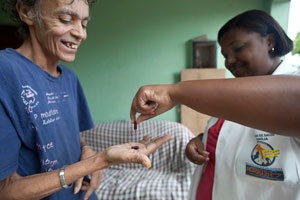- What We Do
- Agriculture and Food Security
- Democracy, Human Rights and Governance
- Economic Growth and Trade
- Education
- Ending Extreme Poverty
- Environment and Global Climate Change
- Gender Equality and Women's Empowerment
- Global Health
- Water and Sanitation
- Working in Crises and Conflict
- U.S. Global Development Lab

Patient Luis Antonio Soares receives DOTS TB therapy from Nurse Vanessa da Silva Roque.
Photo credit: USAID Brazil/Ricardo Funari
In Latin America, where 80 percent of the population lives in cities, the urban population tends to have higher rates of poverty and TB. This is due to the increased population density, crowded living conditions and poor access to health services. The combination of these circumstances creates concentrated pockets of TB in urban slums, where, as the population continues to grow, living conditions continue to worsen.
In an effort to leverage existing local resources and social protection programs and increase access to health services and TB treatment to the urban poor of Latin America, USAID partnered with the Pan American Health Organization (PAHO) to address TB in urban centers. Focusing on municipalities with a high burden of TB, the project works with city governments and local health authorities to identify vulnerable populations living in their jurisdictions, address barriers that impede these individuals from accessing health services and develop strategies to improve TB diagnosis and treatment among these populations.
This USAID-supported project has already seen tremendous success in Guarulhos, a large city in the metropolitan area of Sao Paulo, Brazil, and has been welcomed with strong commitment from local authorities. A situational analysis was completed at the beginning of the project to provide the city government and health authorities with key data needed to inform their decisions and strengthen TB control in their communities. Most importantly, at the local government level, analyses were completed to find ways to incorporate TB activities and funding in strategic plans at the national and local levels.
The modest investment by USAID has led to significantly increased collaboration and partnership with civil society groups, other areas of the health sectors, and an informed local government with a strong commitment for TB control. Given this success, Brazil’s NTP has expanded this approach to 12 other cities with their domestic funding of approximately US$6.8 million to improve access to TB diagnosis and treatment for the urban poor.







Comment
Make a general inquiry or suggest an improvement.